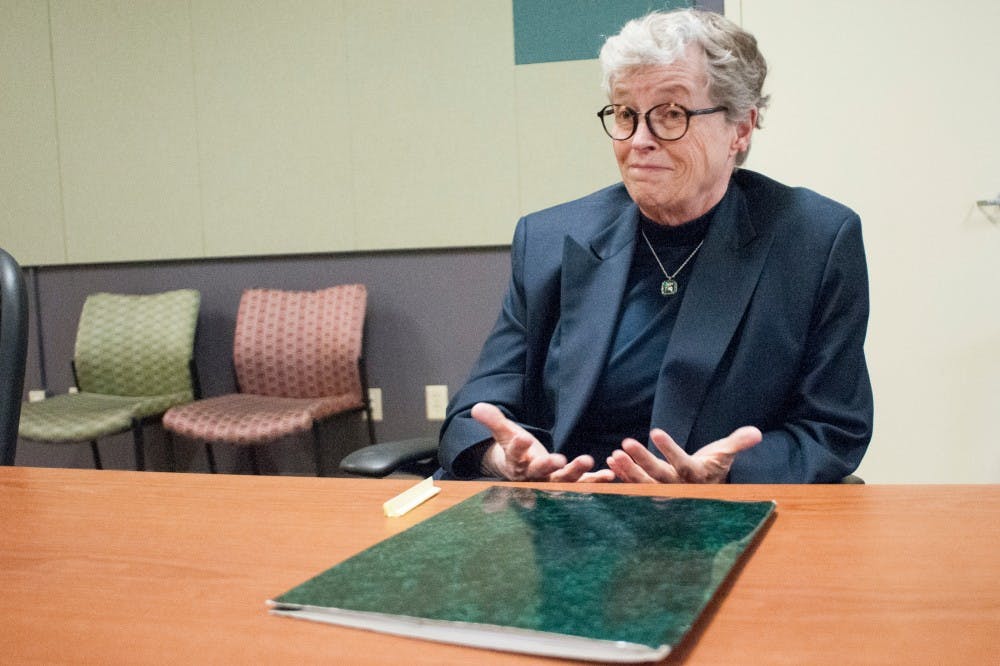Simon said she does not know how much money will be spent on legal fees incurred from Nassar investigations, attorneys and an outside Title IX consultant. The funds will come from “resources available to the university.”
“It doesn’t matter, we have to find the truth,” Simon said.
The MSU football team and coaching staff are currently facing a review of their program because of the alleged sexual assault involving three players and staff member.
Simon said she was the one who started the investigation.
“Part of my responsibility is to figure out what I don’t know, not to rely on what I know,” Simon said.
All the clinics and health teams at MSU were also under review, not just the ones Nassar was a part of, Simon said.
“It was a health team review about best practice,” Simon said. “Part of it is being sure that there is documentation even though there might have been chaperones or consent. ... That’s part of the prudence of looking at issues and then seeing how we can match them up to best practice.”
It was unclear at the time of the meeting, March 3, if a letter had been sent to former student-athletes who had contact with Nassar. Nassar was fired by the university in September 2016 amid allegations of sexual misconduct.
“A letter has been sent to former student-athletes,” Simon said.
She continued, “they are now stuffing envelopes. There’s a large number of people.”
When asked what the letter said, Simon said, “you can figure that out yourself. It’s a general information request to former student-athletes.”
A letter dated March 2 was sent to current and former student-athletes from MSU Athletic Director Mark Hollis.
As of Feb. 22, 81 alleged victims of Nassar had come forward to MSU police.
“I’m gratified in one way that the number of people who have come forward in the criminal investigation have been larger than we had anticipated,” Simon said. “I'm gratified because that means they have confidence in the way in which the police department has been very victim-centric in their interviews.”
Former MSU head gymnastics coach Kathie Klages retired on Feb. 14, one day after she was suspended with pay. Klages is alleged to have discouraged a gymnast from reporting alleged sexual abuse from Nassar.
Klages will receive retirement benefits from MSU, Simon said.
“If you look at the statement, she retired,” Simon said.
Simon would not confirm nor deny if Klages is or could be the subject of an investigation.
Support student media!
Please consider donating to The State News and help fund the future of journalism.
“There’s a myriad of people who will be under review,” Simon said. “A myriad of people will be under review, OK?”
Simon’s take on the current biggest concerns MSU faces: “It’s not the fear of necessarily what was said today, but what might be said tomorrow.”
Simon said uncertainty of issues at the state and federal levels contribute to some of the biggest questions MSU is currently faced with. Among these issues are matters of social policy and budget.
There is unpredictability on social policy at the federal level and not much that the university can say. Simon said she believes the ambiguity can cause worry for students, however there is not a lot MSU can do to ease the worries because everything depends on what President Donald Trump says.
“Some of it is what (President Trump) will say in the next executive order and some of it is what we’re all seeing in social media,” Simon said. “It just presents it—in particular, for places like this—a lot of uncertainty in cases of some students.”
New social policies at the federal level could have lasting implications for the university and MSU students, Simon said.
Families, study abroad programs and more have the potential to be affected under Trump's administration.
“It’s not the fear of necessarily what was said today, but what might be said tomorrow,” she said. “And that will potentially have an effect on recruitment, it will potentially have an effect on things like study abroad, in unusual ways with families that you might not think would be affected are still very concerned about how Americans will be treated abroad.”
Another problem Simon said she believes the university is facing is that there are not many positive statements about the value of higher education and there is a shifting emphasis toward training instead of going to college.
“Then it’s a shifting of who is the base that people are trying to speak to,” she said. “That base is very evident in Michigan, and so if there are more jobs created, that will be good. And it’ll help all of the issues regarding state funding. … But that’s yet to happen or to know what will happen.”
Simon also cited the uncertainty of the financial climate surrounding state and federal budgets as a concern. She said the implications of a skinny budget could have intense effects on the university.
The skinny budget is a strategy from Trump to cut spending that is deemed unnecessary. The budget should be released in mid-March, according to USA Today.
“The budget circumstances are not going to be good,” Simon said. “If you look at the federal level and the balance of this skinny budget, it can have profound impact on areas that are critical to others. Those are still unknown because it is a skinny budget, but it re-balances a lot of money towards the feds and away from discretionary spending.”
Simon's take on sanctuary campus status: "I don't see much changing in what we're doing."
In wake of the recent executive orders regarding immigration, the idea of creating sanctuary campuses has become a hot button topic among universities and colleges.
Sanctuary campuses are any higher education institutions that follow policies that will protect undocumented immigrants. While MSU will not release the immigration status of its students per protocol, MSU is not officially a sanctuary campus, and it appears that will not change anytime soon.
“I don’t see much changing in what we’re doing, we just have to get a better clarity on policy, frankly,” Simon said.
Simon said the soundest policy position the university can take is to keep supporting its students.
“What we need to do, from my perspective, is continue to provide resources to students, keep the policy position we’re taking regarding identification and continue to monitor and argue for dreamers," she said.
In a statement on the March 6 executive order, Simon said, "I concur with many colleagues across the country in the belief that U.S. citizens can be protected without compromising American universities' global competitiveness for attracting top talent."
She also said an executive team, led by MSU Associate Provost and Dean for International Studies and Programs Steve Hanson, has been and will continue to monitor the situation. The team provides resources to students through the Office for International Students and Scholars website.
When asked if sanctuary campuses can create an unsafe environment for students, Simon said it is an arguable point.
“I think if you read the president’s response to (sanctuary campuses) and look at some of the raids that have been made nationally, there have been raids on sanctuary campuses," Simon said. "And the question is whether you would want to be on that list, if that’s to your advantage, or whether it ultimately puts your students at a disadvantage.”
Simon said it is easier for religious colleges and universities to attain sanctuary status.
“I don’t want to make promises to students we can’t keep, which I think is the other worst part of some of this," Simon said. "And that’s all unfolding.”
Simon’s take on Milo Yiannopoulos’s appearance at MSU: “I’m a free speech advocate.”
Conservative speaker Milo Yiannopoulos appeared at MSU on Dec. 7, 2016, after some students called for Simon to cancel his speech. Dozens of students protested the event, and several arrests were made by MSU police.
Simon said she supports the right of both Yiannopoulos and the protesters to speak. The arrests, she said, weren’t about stopping the protests.
“They could yell as loud as they wanted,” Simon said. “They just couldn’t bar the door.”
Simon said that universities have to be depoliticized to survive.
“I personally think it’s a very dangerous slope to not let student groups bring speakers, however controversial they might be, on the right or the left, to a university,” Simon said.
Simon said it was a “principled decision” to allow Yiannopoulos to speak at MSU.
“We’ve got to be able to listen to things we don’t like,” she said. “And we’ve got to listen to them with as much respect as possible.”
Discussion
Share and discuss “MSU president meets with State News editorial board, discusses Nassar and football investigation” on social media.




